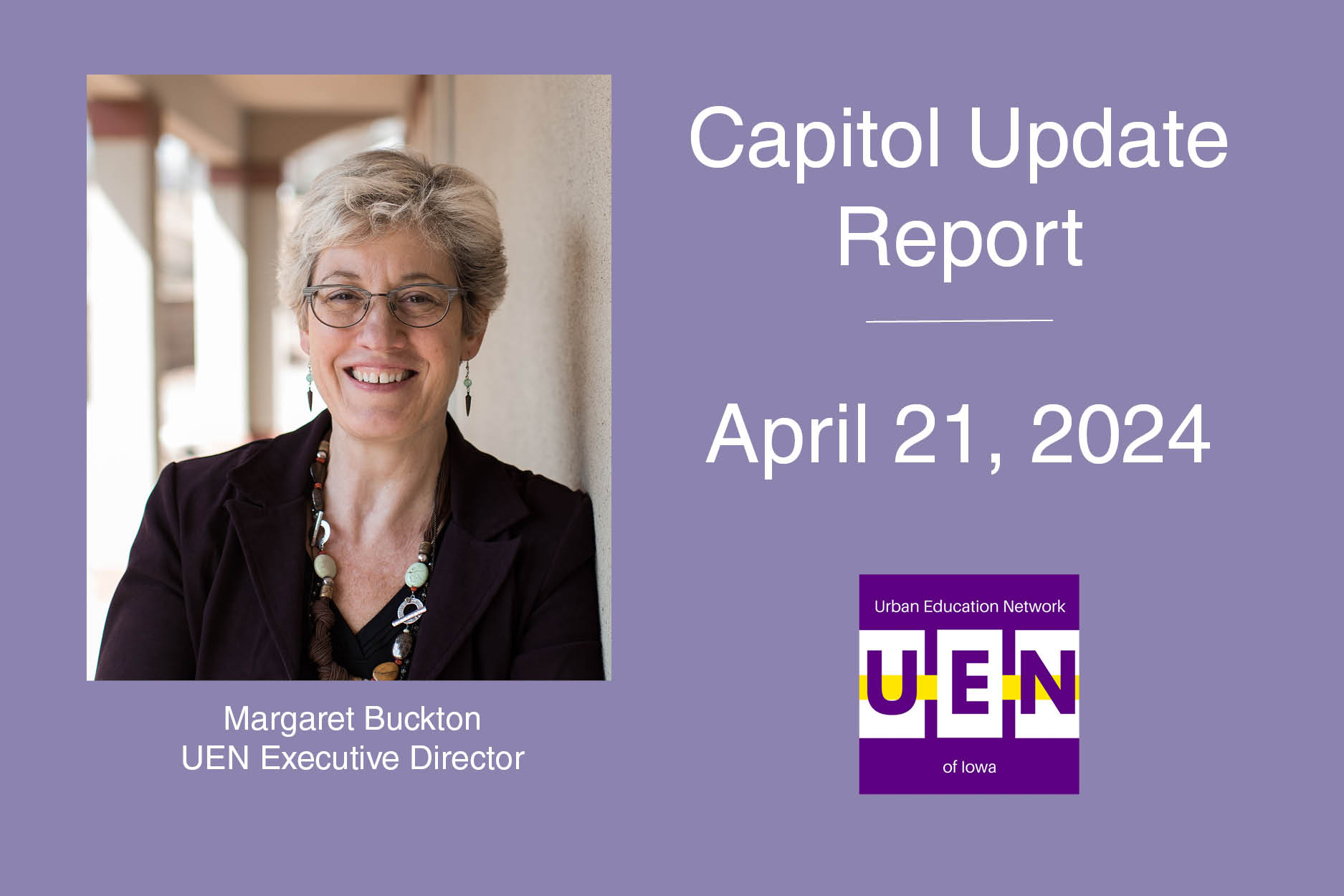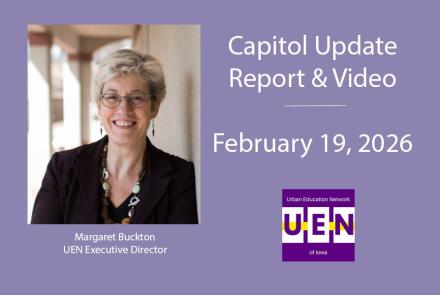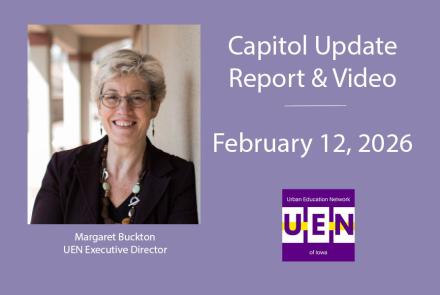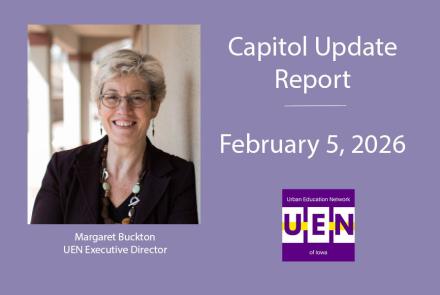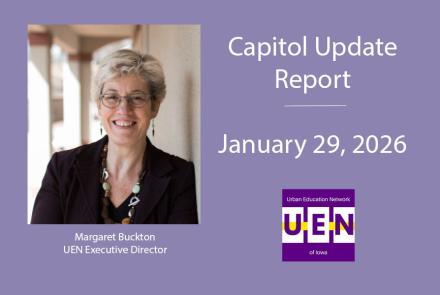Capitol Update - April 21, 2024
UEN Legislative Update
April 21, 2024
Download the Printer-Friendly Legislative Update
As the Legislature adjourned the 2024 Session early on Saturday morning, here are a few highlights. We will have a complete report soon with all of the other actions during the final days of the Session. Stay tuned for more.
SF 2368 Charter Schools: requires money to follow students to charter schools and via open enrollment, including the current year state cost per pupil, and categorical per pupil supplements of professional development and early intervention class size. (Teacher leadership per pupil categorical already follows students to charter school and receiving districts.) Also requires a school district to sell real property to an educational institution if the educational institution is the highest bidder and prohibits school districts from prohibiting sale of property to nonpublic or charter schools, or other educational institutions. The House added the requirement that students in virtual charter schools can participate in up to two extracurricular activities in their district or residence, and the district of residence receives $250 per activity per semester. The bill allows a charter school that does not offer extracurricular activities to partner with any public school, nonpublic school or other charter school. The bill does not mandate that public schools partner with charter schools. UEN opposed this bill.
SF 2443 Standings Appropriations: this bill was introduced, processed through appropriations committees, and approved in both chambers, all after midnight on Friday. Here are the provisions impacting education:
- A new appropriation of $14 million for the 2024-25 school year (one-time funding) for additional compensation for education support personnel defined according to HF 2612. Requires these funds to be miscellaneous income. HF 2612 requires that district apply for this funding and provide information requested by DE about educational support staff. The funding is distributed per pupil based on budget enrollment.
- Continues current practice of limiting standing appropriations
- $8.997 million for nonpublic school pupil transportation
- Zero for state contribution to instructional support
- Requires proration of the $7.5 million statutory reduction to AEA s be apportioned to school districts and AEAs based on how those funds are allocated after changes to AEA funding. Also continues the reduction of $15 million and an additional $10 million to AEAs, also prorated to AEA and district allocations accordingly. NOTE: in the past, reductions to AEAs are applied to AEA state funding, which is special education, but allowed AEAs to use media and education services funding for special education purposes. Since media and education services money goes in part to school districts in the 2024-25 school year (60%), and totally in the 2025-26 school year, these funds will necessarily result in reduced special education resources.
- Specifies that the 12-years of experience benchmark for the higher teacher pay minimum ($60,000 for FY 2024-25 and $62,000 for FY 205-26) is based on 12 years of experience as of July 1, 2024 and July 1, 2025 respectively.
SF 2485 Education Appropriations, as approved by both chambers and finished Friday. In addition to the line item appropriations shared in the April 11, 2024 weekly report, the following significant policy items were amended onto the bill:
Division VII: Chronic Absenteeism Provisions. This division addresses chronic absenteeism and truancy.
- Board Policy: it requires school boards to have policies and allows policies to be more stringent than required. Requires the policies to contain: 1) how the board of directors determines whether a child is chronically absent, 2) different interventions the board may use when a child is chronically absent, 3) different penalties associated with a child being chronically absent.
- Exceptions: requires the policies not apply to students who have completed graduation requirements or attained a G.E.D, who are excused for sufficient reason by any court or record or judge, who are attending religious services or receiving religious instruction, who are unable to attend school due to a legitimate medical reason, or who has an IEP or 504 plan that affects attendance.
- County Attorney: requires the county attorney of the county where the school’s administrative office is located to be responsible for enforcement and requires any actions to be instituted in that county. Specifies that anyone who violates the terms of an absenteeism prevention plan or refuses to participate in a school engagement meeting commits a public offense. Defines a child who violates the terms of an absenteeism prevention plan, or refuses to participate in a school engagement meeting, is a child in need of assistance and allows that to be the sole basis for a CINA petition and immediate referral to DHHS for investigation. Also allows the county attorney, if a child is chronically absent, to make an immediate referral to DHHS and if the investigation warrants, file a family in need of assistance petition, or a CINA complaint, even if the child is otherwise compliant.
- Definitions: defines “truant” as a child for whom exceptions don’t apply who has been absent from school, for any reason, for at least 20% of days or hours in the grading period. Defines “chronically absent” as absent from school for 20% of days or hours in a grading period established by the school. “School official” means an employee of a public school whose job duties involve identifying children at-risk for becoming chronically absent, creating interventions to limit the rate of student absenteeism and participating in the legal process related to student absenteeism.
- Process for notification: requires the school official to notify the county attorney (mail or email) and send notice by certified mail to child’s parent/guardian/legal custodian or to emancipated minor, including information related to the child’s absences and the policies and disciplinary processes associated with additional absences. Specifies conditions under which the notice may be sent earlier, if the county attorney and school board agree on a number of absences to trigger the notification and if the number is included in the student handbook.
- School Engagement Meeting: if student is absent 15% or more of days/hours in the grading period, requires the school official to attempt to find the cause for the absences and initiate and participate in a school engagement meeting, the purpose of which is to identify barriers to attendance and determine appropriate interventions. Allows the school to initiate the meeting before 15%. Requires the child, the child’s parent/guardian, and a school official to participate in the meeting. Requires creation of the absenteeism prevention plan during this meeting, requires all to sign it, and get a copy. The plan must identify the causes and any future responsibilities for each participant. Requires the school official to monitor compliance, and requires the school official to contact the participants at least once each week during the remainder of the school calendar. Allows the participants to initiate referrals to any series or counseling believed to be appropriate under the child’s circumstances. Requires the county attorney to initiate a proceeding (public offense and/or CINA) if participants fail to enter into an absenteeism prevention plan, violate a term of the plan, or fail to participate in the school engagement meeting. Does not require this process for students in home school (Independent Instruction or Competent Private Instruction).
- Unfunded mandate: Specifies that districts must pay the cost of compliance with state foundation aid and states that no additional state foundation aid is necessary for full implementation.
Division VII Open Enrollment: reinstates the March 1 open enrollment application deadline for 1-12 and Sept. 1 for Kindergarten. Will apply to applications for open enrollment made after the effective date of the bill (July 1, 2024). Specifies good cause exceptions (change in child’s residence due to change in family residence, change in residence from one parent to another, change in the state in which the family residence is located, change in parents’ marital status, guardianship or custody proceeding, placement in foster care, adoptions, foreign exchange program participation, initial placement of PK student in special education program requiring specially designed instruction, or participation in a substance use disorder or mental health treatment program, change in accreditation status of resident district, or permanent closure of a nonpublic schools, revocation of a charter school contract, failure of negotiations or rejection of current whole grade sharing agreement or reorganization plan. Another code section creates exemptions from the deadline if a student is a victim of founded bullying or harassment in their district of residence. Explains processes and requires DE mediation if there’s a dispute. Parent may also appeal to the State Board of Education within 30 days of district denial to open enroll. The bill allows the parent to withdraw the open enrollment request at any time prior to the beginning of the school year, and allows student to return to the district of residence at any time during the school year. A completely new policy is included, to allow the receiving district to prohibit a truant student from continuing open enrollment. Exempts requests to open enroll to virtual schools from the March 1 application deadline established in Division VIII.
Division XIV Open Enrollment State Aid: creates the option for school districts for whom the percentage of students enrolled in the school district as a result of open enrollment is equal to or greater than 45.0% of the total number of students enrolled in the school district, to request modified supplemental amount (spending authority) from the SBRC. School districts may be granted a modified FY 2025 supplemental amount (MSA). A MSA cannot be granted in an amount that exceeds 50.0% of the net change in the following resulting from open enrollment: difference between the district’s regular program district cost per pupil minus the regular program State cost per pupil, TSS district cost per pupil, PD supplement district cost per pupil, and Early intervention/Class size supplement district cost per pupil. Requires a public hearing and the publication of a notice of public hearing to be done prior to the request. Prohibits districts from increasing the combined property tax rate for FY 2026 due to an MSA if doing so would cause the school district levies’ for the budget year to exceed the combined property tax rate for FY 2025. A school district is not eligible for additional MSA if a majority of the students open enrolling into the district are students receiving online instruction from a private provider under Iowa Code section 256.43. Specifies school districts are only eligible for the open enrollment MSA in FY 2025. The LSA estimates granting MSA associated with this request would increase school district spending authority statewide by an estimated total of $1.9 million beginning with FY 2025.
Therapeutic Classrooms: allows DE to transfer unencumbered or unobligated funds from the FY 2024 General Fund appropriation for the Therapeutic Classroom Transportation Claims Reimbursement to the Therapeutic Classroom Incentive Fund established in Iowa Code section 256.25 before the close of the fiscal year.
UEN was registered as undecided on this bill.
Correction from the April 18 Weekly Report: The $10,000,000 for High Needs Schools grants was NOT appropriated for FY 2025, but instead is appropriated for the year beginning July 1, 2025, which is FY 2026. (This item has been a UEN priority since the appropriation was created in Gov. Branstad’s Education Reform Act of 2013. The bill continues the annual delay of the appropriation until July 1, 2025, meaning our report last week that this item has been funded was incorrect.)
Stay tuned for a thorough explanation of Statehouse actions this week.
Margaret Buckton
UEN Executive Director
margaret@iowaschoolfinance.com
515.201.3755 Cell
Thanks to our UEN Corporate Sponsors:
Special thank you to your UEN Corporate Sponsors for their support of UEN programs and services. Find information about how these organizations may help your district on the Corporate Sponsor page of the UEN website at www.uen-ia.org/uen-sponsors.
- Public Progress LLC - thepublicprogress.com
- Solution Tree - www.solutiontree.com/st-states/iowa


